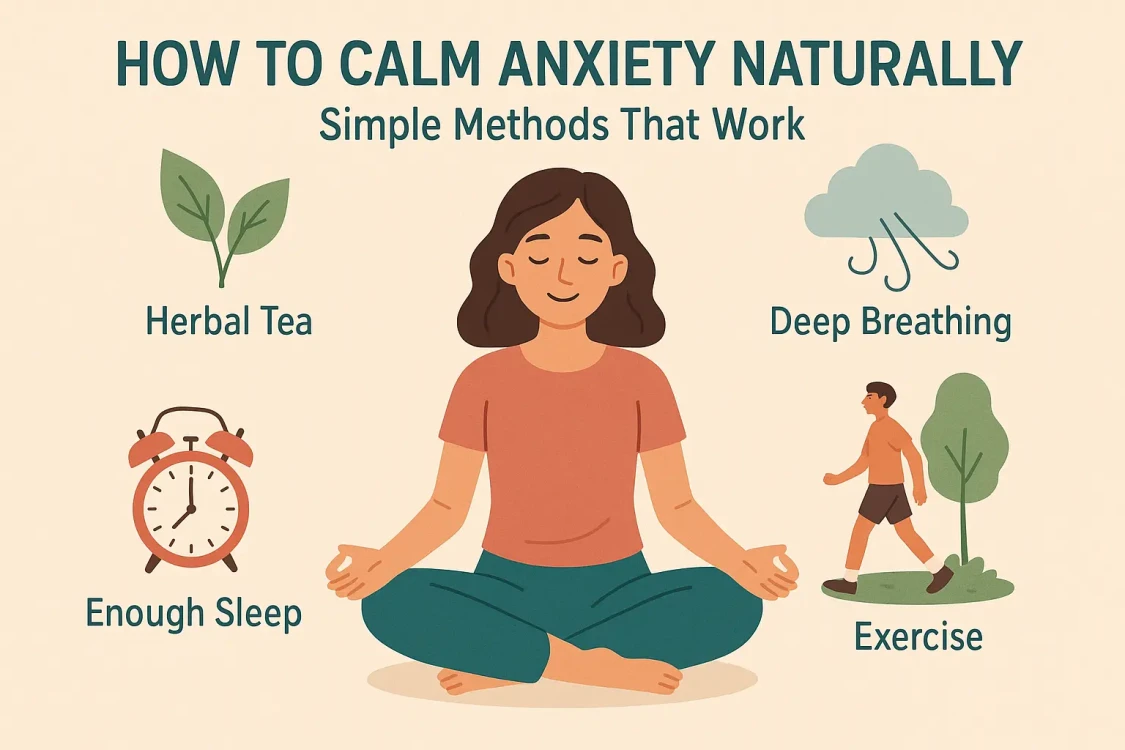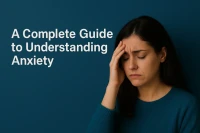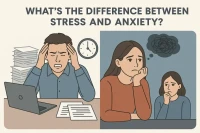Feeling scared, worried, or having trouble breathing sometimes? Your heart beats fast, and you can't stop thinking about bad things. You're not alone. Many people feel this way, and it's called anxiety. The good news is that there are easy ways to feel better and take control of your feelings.
Anxiety touches millions of people every day. Some worry about school tests, work meetings, or talking to new people. Others feel anxious about sleeping at night, being in crowds, or leaving their house. When anxiety shows up, it can feel overwhelming and scary. But you have greater power than you realize to calm these feelings naturally.
People have been finding natural ways to calm anxiety for thousands of years. Before modern medicine, families passed down simple techniques that really worked. These methods are still useful today. They align with how your body naturally deals with stress and worry.
What Happens When You Feel Anxious
When you feel anxious, your body thinks something scary is happening. Your heart beats faster, you might sweat, feel dizzy, or get sick in your stomach. Your hands might shake, and you could have trouble thinking clearly. This is completely normal, but it doesn't feel good at all.
Your brain has a special alarm system that tries to keep you safe. When it thinks danger is coming, it sets off this alarm. Your body gets ready to either fight the threat or run away from it. This is called the fight or flight response. The problem happens when your brain's alarm goes off, even when there's no real danger around you.
Many people feel anxious about certain things. This includes flying in airplanes, taking tests, or meeting new people. Others feel worried about many different things throughout the day. Sometimes anxiety shows up without any clear reason at all. This can feel confusing and frustrating.
Physical signs of anxiety can show up in different ways. You might feel a fast heartbeat or have trouble breathing. Sweating and shaking are common, too. Some people feel hot or cold, while others experience stomachaches or headaches. Tight muscles can also be a sign. Emotional signs include feeling scared, worried, restless, or irritated. You might also sense that something bad could happen. Mental signs include racing thoughts, trouble focusing, forgetting things, and imagining worst-case situations.
Understanding these signs helps you recognize anxiety early. When you catch it starting, you can use calming techniques before it gets too strong. This gives you more control over how you feel.
Quick Ways to Calm Down Right Now
Easy Breathing to Feel Better
The fastest way to calm anxiety is through simple breathing exercises. Your breath is always with you, so you can use these techniques anywhere and anytime you need them.
The 4-7-8 breathing method works really well. Breathe in through your nose while counting to 4. Hold that breath and count to 7. Now breathe out through your mouth while counting to 8. Make a soft whooshing sound as you breathe out. Do this 3 to 4 times. This tells your nervous system that you're safe and helps your heart rate slow down.
Box breathing is another powerful technique. Imagine drawing a box with your breath. Breathe in for 4 counts, hold for 4, breathe out for 4, then pause for 4. Keep going around this breathing box until you feel calmer. Many athletes and soldiers use this method because it works so well.
Belly breathing helps too. Put one hand on your chest and one on your stomach. Breathe so that the hand on your stomach moves more than the hand on your chest. This type of breathing reaches the deepest parts of your lungs and sends calm signals to your brain.
Use Your Five Senses for Grounding
When anxiety feels too big, grounding exercises can help you return to the present. The 5-4-3-2-1 technique uses all your senses to ground you.
Look around and find 5 things you can see. Really focus on them and notice their colors, shapes, and details. Listen carefully for 4 different sounds around you. Maybe you hear cars outside, air conditioning, or people talking. Touch 3 different things near you. Feel their texture, temperature, and weight. Smell 2 different scents in the air. Finally, taste 1 thing, like gum, a mint, or notice the taste in your mouth.
This technique works because it makes your brain focus on the present. So, you don’t worry about future problems or past mistakes. Your senses connect you to the present moment, which is the safest place to be.
Natural Remedies for Long-Term Anxiety Relief
Calming Tea for Anxiety and Relaxation
Herbal teas have helped people feel calmer for centuries. These natural remedies are gentle and safe for most people to use regularly.
Chamomile tea is the most famous calming tea. It contains compounds that work similarly to mild anti-anxiety medications. Drink a warm cup of chamomile tea about 30 minutes before bedtime to help with sleep anxiety. You can also sip it during the day when you feel stressed.
Passionflower tea is another excellent choice for anxiety relief. Research shows it can work as well as some prescription drugs for easing anxiety. It has a mild, pleasant taste and helps quiet racing thoughts.
Lemon balm tea helps with both anxiety and sleep problems. It's part of the mint family and has a fresh, citrusy flavor. Green tea has L-theanine. This amino acid helps you relax but doesn’t make you sleepy.
Prepare these teas properly to get the most benefits. Use hot water that's just below boiling. Let the tea steep for 5 to 10 minutes to extract the helpful compounds. Drink your tea slowly and focus on the warm feeling spreading through your body.
Essential Oils for Calming Anxiety
Aromatherapy uses natural plant oils to promote physical and emotional well-being. Certain scents can quickly change your feelings. They affect your brain's emotional center.
Lavender oil is the most researched essential oil for anxiety. Just smelling lavender can lower your heart rate and blood pressure. Put a few drops on a tissue and breathe deeply, or add some to your bath water. Never put undiluted essential oils directly on your skin.
Bergamot oil has a fresh, citrusy scent that lifts mood and reduces stress. Ylang-ylang oil helps with both anxiety and sleep problems. Frankincense oil promotes deep, calm breathing and helps quiet busy thoughts.
Use essential oils safely. Always dilute them with a carrier oil like coconut or jojoba oil before putting them on skin. You can use a diffuser to fill your room with scent. Or, smell the oils from the bottle for quick relief.
Supplements That Support Calm Feelings
Some natural supplements can help your body manage stress and anxiety. Talk to your healthcare provider before starting new supplements. This is important, especially if you take any medications.
Magnesium is often called the relaxation mineral. Many people don’t get enough magnesium in their diet. This lack can worsen anxiety. Magnesium helps your muscles relax and supports healthy sleep. You can find it in foods like bananas, nuts, seeds, and dark leafy vegetables.
L-theanine is an amino acid found in green tea. It promotes relaxation without causing drowsiness. Many people find it helps reduce anxiety. It also keeps them alert and focused during the day.
B vitamins, especially B6 and B12, support your nervous system's health. When you're stressed or anxious for long periods, your body uses up B vitamins faster. Omega-3 fatty acids from fish oil support brain health. They may also help reduce anxiety symptoms.
How to Calm Anxiety at Night and Sleep Better
Nighttime anxiety is very common. When the day gets quiet, anxious thoughts often get louder. Many people struggle to calm anxiety at night. This is mainly because there are fewer distractions from worrying thoughts.
Creating Your Calming Bedtime Routine
Start preparing for sleep 1 to 2 hours before bedtime. Dim the lights in your home to signal to your brain that it's time to get sleepy. Bright lights tell your brain to stay awake and alert.
Take a warm bath or shower. The drop in body temperature after you get out naturally makes you feel drowsy. Add some Epsom salts or lavender oil to your bath for extra relaxation benefits.
Keep your bedroom cool, dark, and quiet. Your body sleeps best when the room temperature is between 65 and 68 degrees. Use blackout curtains or an eye mask to block out light. Consider using a white noise machine or earplugs if outside sounds wake you up.
Create a consistent routine you do every single night.
This can include:
- Reading a book
- Writing in a journal
- Doing gentle stretches
- Listening to calming music for anxiety
Having the same routine helps your brain recognize that it's time to wind down.
Managing Middle-of-the-Night Anxiety
If you wake up feeling anxious, resist the urge to check your phone or turn on bright lights. The blue light from screens can make it harder to fall back asleep.
Try progressive muscle relaxation instead. Start with your toes and slowly tense and then relax each muscle group in your body. Work your way up to your head. This helps ease physical tension. It also gives your mind a focus away from anxious thoughts.
If your mind won't stop racing, keep a notebook by your bed. Write down your worries so you can deal with them tomorrow. This gets them out of your head and onto paper, where they can't keep you awake.
Practice the breathing exercises you learned earlier. The 4-7-8 breathing technique is great for falling back asleep. It helps you feel drowsy naturally.
Moving Your Body to Reduce Daily Anxiety
Exercise is one of the most powerful natural treatments for anxiety. Moving your body changes your brain chemistry. This can lift your mood and lower worry.
You don't need intense workouts to get benefits. A 10-minute walk can start to reduce anxiety symptoms. Moving regularly helps your body handle stress hormones. It also boosts feel-good chemicals known as endorphins.
Walking outside in nature provides extra benefits. Fresh air, sunlight, and green spaces all help reduce stress and anxiety. If you can't get outside, even walking up and down stairs or around your house helps.
Dancing to your favorite music combines movement with something fun. It's hard to feel anxious when you're moving to music you love. Dancing also helps release tension and negative energy from your body.
Yoga combines gentle movement with breathing and mindfulness. Yoga helps many people with anxiety. It targets both the body and mind, easing stress.
Swimming, bike riding, and other rhythmic activities help calm anxiety. They do this by naturally regulating your breathing. The repetitive movements can be meditative and soothing.
Start small if you haven't exercised in a while. Even 5 minutes of movement is better than none. Gradually increase the time as your body gets used to being active again.
Foods and drinks that help calm anxiety
What you eat and drink directly affects how you feel. Some foods help your body manage stress. Others can increase anxiety.
Eat regular meals to keep your blood sugar steady. When you skip meals or go too long without eating, your blood sugar drops. This can trigger anxiety symptoms like shakiness, irritability, and a racing heart. Aim to eat something every 3 to 4 hours during the day.
Choose foods that provide steady energy instead of quick spikes. Whole grains, lean proteins, fruits, and vegetables give you energy that lasts longer. Foods like oatmeal, eggs, nuts, and beans help keep your mood stable throughout the day.
Stay hydrated by drinking plenty of water. Mild dehydration can boost anxiety and make clear thinking tougher. Keep a water bottle with you and sip from it regularly.
Limit caffeine, especially in the afternoon and evening. Caffeine can cause anxiety in sensitive people. It may also disrupt sleep for up to 6 hours after consumption. If you love coffee or tea, try switching to decaffeinated versions after lunch.
Alcohol might seem like it helps anxiety at first, but it actually makes anxiety worse over time. Alcohol disrupts sleep quality and can cause rebound anxiety as it wears off.
Magnesium-rich foods, such as dark chocolate, nuts, and leafy greens, can help you relax. Omega-3 foods like salmon, walnuts, and flax seeds are good for brain health. They might also help reduce anxiety symptoms.
Building Your Personal Anxiety-Calming Toolkit
Everyone experiences anxiety differently, so different calming methods work better for other people. The key is to experiment and find what works best for you.
Try keeping an anxiety journal for a week. Write down when you feel anxious, what seems to trigger it, and which techniques help you feel better. This information helps you understand your patterns and prepare for challenging situations.
Practice your chosen techniques when you feel calm, not just during anxious moments. This makes them more effective when you really need them. It's like building muscle memory for relaxation.
Create a go-to list of your most effective calming strategies. Write them down and keep the list somewhere easy to find. When anxiety hits, it can be hard to remember what usually helps you feel better.
Consider learning from different sources. Books, apps, online videos, and classes can teach you new techniques. Some people like guided meditations. Others prefer calming music or nature sounds.
When to Seek Professional Help
These natural methods help many people manage their anxiety successfully. However, sometimes additional support is needed, and that's completely normal and okay.
If anxiety impacts your daily life, talk to a professional. This includes how it affects your relationships, work, or school. If you avoid places or activities because of anxiety or feel anxious a lot, getting help from a professional can really make a difference.
Therapy, especially cognitive-behavioral therapy, teaches you skills to manage anxious thoughts and behaviors. Many therapists also support using natural calming methods alongside professional treatment.
Sometimes medication can be helpful, especially for severe anxiety. A healthcare provider can help you explore your options. They’ll find the best approach for your needs.
Don't wait until anxiety becomes overwhelming to seek help. Early intervention usually results in better outcomes. It can also stop anxiety from worsening over time.
Final Thoughts on Natural Anxiety Management
Feeling anxious is a normal human experience, and you have the power to learn effective ways to manage it. These natural methods need practice, but they can really boost your daily well-being.
Be patient and gentle with yourself as you learn what works best. Some techniques may seem awkward at first. But with practice, they feel more natural. Celebrate small improvements along the way.
You're not alone in dealing with anxiety. Millions of people around the world use these same techniques to feel calmer and more in control. With practice and some help, you can grow more confident in handling anxious feelings.
Your mental health is important. Taking care of it is a great investment in your overall well-being and happiness.




Comments